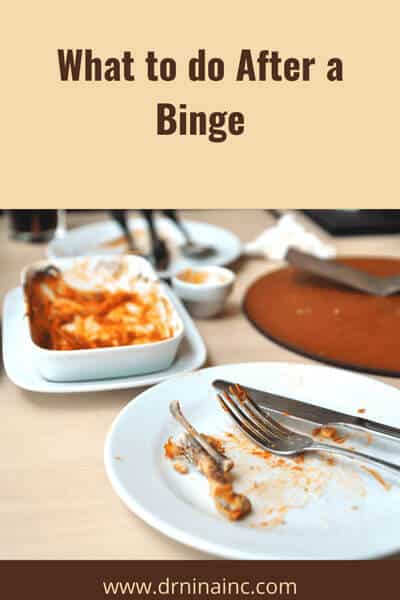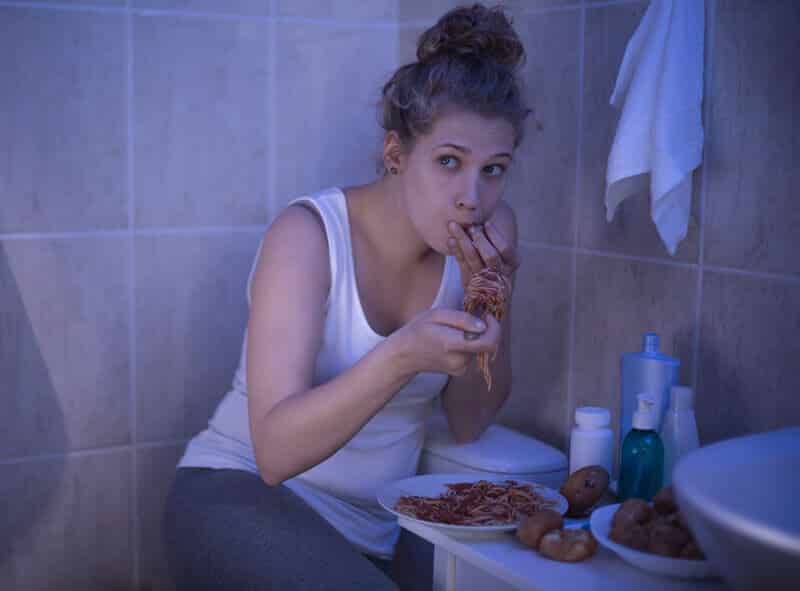Dr. Nina Savelle-Rocklin
What To Do After A Binge
Table of Contents
- What to do after a binge immediately is:
- Don’t Focus on “the Weight You Gained” by Bingeing
- What to do After Binge Eating at Night
- To Wrap it Up
If you’ve ever wondered what to do after a binge, you’re already taking a crucial step toward change. Figuring out WHY you binged is the best way to prevent future binges. That’s a part of healing within and creating freedom with food FOREVER!
Let’s do a quick overview of what to do after a binge, and then I’ll go into each one in more detail below.

What to do after a binge immediately is:
- Be a detective. Figure out why you binged in the first place. What was the trigger?
- We're not triggered by food. We're triggered by situations.
- Was the trigger deprivation? We usually want what we cannot have.
- Be a friend to yourself.
- Don’t vow to be “good” later with food.
First of All, Be a Detective
After you binge, it’s time to get curious. You are NOT bingeing because you lack “willpower.” You binge because you are turning to food to cope or protect yourself from something that is painful or upsetting in your life.
Think about the events that led up to the binge. What was going on? How were you feeling about them? What were you thinking about the event? Also, what was the trigger?
Give your emotions a voice! I love journaling for this. It lets you safely express your feelings and is a powerful way of releasing them.
Food is Not the Trigger
We often think we’re triggered by food, that we crave pizza or ice cream or snacks. Food isn’t the real cause of a binge. In fact, food is actually the solution to the problem.
Bingeing is a way of symbolically stuffing our emotions, soothing ourselves, numbing ourselves, or turning emotional pain into physical pain. Emotions trigger us, and we eat to cope.
There are two ways to deal with feelings: distraction and expression. Eating is a negative distraction because it causes you more harm than good.
On the other hand, if you EXPRESS what you're feeling, the emotion goes away, and you no longer will turn to food for relief.
Deprivation

The anticipation of deprivation or the experience of deprivation makes us want what we cannot have.
If your diet doesn’t allow you to eat your favorite foods, it’s hard to stop eating them when you finally have them. We want what we can’t have.
Thus, the answer is to allow yourself to have what you want in moderation. If you know you can have pizza, for example, whenever you want, you’ll be less likely to binge on pizza.
Be a Friend to Yourself
Talk to yourself as you would a friend. Friends are curious, not critical.
Friends don't say, “You're so disgusting for eating all that.” Friends say, “What's going on? I'm here for you. How can I help?”
Listen to the words you say to yourself and rephrase them to be more like the words you would say to a friend, a child, or someone you care about and love.
Don’t Vow to “be Good” Later with Food
Instead of telling yourself, you’re going to “be good” later, vow to be kind to yourself, be there for yourself, and support and encourage yourself.
Be your own best friend and treat yourself with compassion. When you’re kind to yourself, you feel good, and when you feel good, you don’t binge to cope.
Don’t Focus on “the Weight You Gained” by Bingeing

Instead of focusing on the weight, you might have gained by bingeing, focus on what's weighing on you. If it helps, remember, it takes a large number of extra calories (3500) to gain even a pound.
To put that in perspective, you would have to eat five and a half Whoppers!
One binge is not going to make you gain a lot of weight. Rather than focusing on burning off the calories you took in, spend this time investigating what caused you to binge in the first place.
What to do After Binge Eating at Night
All of these tips apply to nighttime bingeing too. It can be easy to let your thoughts get negative at night (especially if you are alone.)
Take a step back, remember to be kind to yourself, and follow all of the tips in this post.
Read my other post if you are looking for more information to stop binge eating at night.
To Wrap it Up
After a binge, look for clues to see what triggered you to binge.
Ask yourself what was happening in your life before you started bingeing. Was something upsetting you? Were you feeling deprived? Then, instead of vowing to “be good” with food, be kind and encourage yourself as you would a friend.
When you make peace with yourself, you make peace with food for good.
Sick of obsessing about every bite?
GET THE CURE
The Binge Cure Book!
Enter “CURE” to receive a 20% discount.
No, I don’t want access to this terrific resource to help me overcome binge eating.
The Author

Dr. Nina Savelle-Rocklin is a renowned author and podcast host and one of the nation’s leading psychoanalysts known for the psychology of eating. Her signature message of, “It’s not what you’re eating, it’s what’s eating ‘at’ you” has resonated with hundreds of thousands of listeners from around the globe in 40 countries. As founder of The Binge Cure Method, she guides emotional eaters to create lasting food freedom so they can take back control of their lives and feel good in their bodies.
Related Blogs





















